| Line 56: | Line 56: | ||
On Istvaan III, the remaining Loyalists, under the command of Captains Tarvitz, [[Garviel Loken]] and [[Tarik Torgaddon]], another Loyalist member of the Sons of Horus, fought bravely against their own traitorous brethren. Yet, despite some early successes that delayed Horus' plans for three full months while the battle on Istvaan III played out, their cause was ultimately doomed by their lack of air support and [[Titan]] firepower. During the battle the Sons of Horus Captains [[Abaddon the Despoiler|Ezekyle Abaddon]] and [[Horus Aximand]] were sent to confront their former [[Mournival]] brothers, Loken and Torgaddon. Horus Aximand beheaded Torgaddon, but Abaddon failed to kill Loken when the building they were in collapsed. Loken survived and witnessed the final orbital bombardment of Istvaan III that ended the Loyalists' desperate defence. To prove his worth and loyalty to Lord Commander [[Eidolon]] of the Emperor's Children -- and thus to his Primarch, [[Fulgrim]] -- Captain [[Lucius the Eternal|Lucius]] of the 13th Company of the Emperor's Children, the future [[Champion of Chaos|Champion]] of [[Slaanesh]] known as [[Lucius the Eternal]], turned against the Loyalists that he had fought beside because of his prior friendship with Saul Tarvitz. Lucius slew many of them personally, an act for which he was then accepted back into the Emperor's Children on the side of the Traitors. In the end, the Loyalists retreated to their last bastion of defense, only a few hundred of their number remaining. Finally, tired of the conflict, Horus ordered his men to withdraw, and then had the remains of the Choral City bombarded into dust for a final time from orbit. |
On Istvaan III, the remaining Loyalists, under the command of Captains Tarvitz, [[Garviel Loken]] and [[Tarik Torgaddon]], another Loyalist member of the Sons of Horus, fought bravely against their own traitorous brethren. Yet, despite some early successes that delayed Horus' plans for three full months while the battle on Istvaan III played out, their cause was ultimately doomed by their lack of air support and [[Titan]] firepower. During the battle the Sons of Horus Captains [[Abaddon the Despoiler|Ezekyle Abaddon]] and [[Horus Aximand]] were sent to confront their former [[Mournival]] brothers, Loken and Torgaddon. Horus Aximand beheaded Torgaddon, but Abaddon failed to kill Loken when the building they were in collapsed. Loken survived and witnessed the final orbital bombardment of Istvaan III that ended the Loyalists' desperate defence. To prove his worth and loyalty to Lord Commander [[Eidolon]] of the Emperor's Children -- and thus to his Primarch, [[Fulgrim]] -- Captain [[Lucius the Eternal|Lucius]] of the 13th Company of the Emperor's Children, the future [[Champion of Chaos|Champion]] of [[Slaanesh]] known as [[Lucius the Eternal]], turned against the Loyalists that he had fought beside because of his prior friendship with Saul Tarvitz. Lucius slew many of them personally, an act for which he was then accepted back into the Emperor's Children on the side of the Traitors. In the end, the Loyalists retreated to their last bastion of defense, only a few hundred of their number remaining. Finally, tired of the conflict, Horus ordered his men to withdraw, and then had the remains of the Choral City bombarded into dust for a final time from orbit. |
||
====Preparations and Allegiances==== |
====Preparations and Allegiances==== |
||
| − | Much of |
+ | Much of Horus' later success arose from the thorough groundwork he had laid before the opening shots of the Heresy were fired at [[Istvaan III]]. He had already swayed the Primarchs [[Angron]] and [[Mortarion]], of the [[World Eaters]] and [[Death Guard]] Legions, respectively, to the side of [[Chaos]] because of their own various personal grudges against the Emperor. [[Fulgrim]] of the [[Emperor's Children]] had been lured to the side of the Warmaster by the promise of power and personal perfection that the [[Chaos Gods]], especially [[Slaanesh]], offered to him and his vain [[Astartes]]. [[Lorgar]] of the [[Word Bearers]], who had been responsible for the nascent rebellion and Horus's own corruption by Chaos, was also with the Warmaster. Three of the most loyal Legions who could not be swayed to the side of Chaos, the [[Dark Angels]], [[Blood Angels]] and [[Ultramarines]] and their [[Primarchs]], were sent on missions by the Warmaster far from [[Terra]] and the Istvaan System. The [[Imperial Fists]] and [[White Scars]] were too close to [[Terra]] to be contacted without raising suspicion, though Horus believed -- mistakenly -- that the White Scars' Primarch [[Jaghatai Khan]], would ultimately take his side. Shortly before the [[Drop Site Massacre]] on [[Istvaan V]], [[Fulgrim]] also attempted to sway his friend [[Ferrus Manus]] of the [[Iron Hands]] Legion to Horus' cause by using many of the same inducements that had been offered to the [[Adeptus Mechanicus]], with whom the [[Iron Hands]] were closely allied in both temperament and philosophy. This attempt failed, and [[Fulgrim]] barely escaped with his life. Angered by the rebuff, [[Fulgrim]] promised he would deliver Manus' severed head to Horus in recompense, a promise he kept on [[Istvaan V]]. The [[Blood Angels]] were sent to the daemon-infested Signis Cluster and the [[Ultramarines]] to the world of [[Calth]], where a large [[Word Bearers]] force, under First Captain Kor Phaeron, had massed to hold [[Roboute Guilliman]]'s equally massive Legion in place while Horus made his play for Terra. |
| − | Of the other eventual Traitor Primarchs, [[Konrad Curze]], the [[Konrad Curze|Night Haunter]], was due to face disciplinary action from the Emperor which he did not believe he deserved; the [[Alpha Legion]] Primarch [[Alpharius Omegon|Alpharius]] had always been closer personally to his brother Horus than to his father the Emperor, although some evidence indicates that he and his twin brother [[Alpharius Omegon|Omegon]]'s turn to [[Chaos]] was driven by mistaken loyalty to the Emperor; and the [[Iron Warriors]]' Primarch [[Perturabo]]'s open and bitter rivalry with [[Rogal Dorn]] of the [[Imperial Fists]] and his feeling that he and his Legion were handed the worst tasks in the Great Crusade for which they |
+ | Of the other eventual Traitor Primarchs, [[Konrad Curze]], the [[Konrad Curze|Night Haunter]], was due to face disciplinary action from the Emperor which he did not believe he deserved; the [[Alpha Legion]] Primarch [[Alpharius Omegon|Alpharius]] had always been closer personally to his brother Horus than to his father the Emperor, although some evidence indicates that he and his twin brother [[Alpharius Omegon|Omegon]]'s turn to [[Chaos]] was driven by mistaken loyalty to the Emperor; and the [[Iron Warriors]]' Primarch [[Perturabo]]'s open and bitter rivalry with [[Rogal Dorn]] of the [[Imperial Fists]] and his feeling that he and his Legion were handed the worst tasks in the Great Crusade for which they never received the recognition they believed they were due made him an easy target for corruption. |
The [[Thousand Sons]] had never planned to join Horus, but the path [[Tzeentch]] had mapped for that Legion and their potent psychic Primarch [[Magnus the Red]] ultimately led them to [[Chaos]] regardless. Unfortunately, the [[Space Wolves]]' unexpected assault on the Thousand Sons' homeworld -- a brutal campaign remembered as the [[Scouring of Prospero]] -- resulted in the destruction of the libraries of precious knowledge that Magnus and his fellow Thousand Sons held so dear. Mortally wounded by [[Leman Russ]], Magnus fell to temptation as he watched Tizca, the capital city of [[Prospero]] and its famed libraries of ancient knowledge burn and he called out to the [[Chaos God]] Tzeentch to save both himself and the remains of his Legion. The God of Sorcery was only too happy to oblige and he transported Magnus and the Thousand Sons through the [[Warp]] to the [[Daemon World]] later known as the [[Planet of the Sorcerers]]. Magnus became a [[Daemon Prince]] of Tzeentch and now desired only vengeance against the Emperor for what he saw as a betrayal, never realizing that it was Horus who had truly engineered his downfall and corruption. |
The [[Thousand Sons]] had never planned to join Horus, but the path [[Tzeentch]] had mapped for that Legion and their potent psychic Primarch [[Magnus the Red]] ultimately led them to [[Chaos]] regardless. Unfortunately, the [[Space Wolves]]' unexpected assault on the Thousand Sons' homeworld -- a brutal campaign remembered as the [[Scouring of Prospero]] -- resulted in the destruction of the libraries of precious knowledge that Magnus and his fellow Thousand Sons held so dear. Mortally wounded by [[Leman Russ]], Magnus fell to temptation as he watched Tizca, the capital city of [[Prospero]] and its famed libraries of ancient knowledge burn and he called out to the [[Chaos God]] Tzeentch to save both himself and the remains of his Legion. The God of Sorcery was only too happy to oblige and he transported Magnus and the Thousand Sons through the [[Warp]] to the [[Daemon World]] later known as the [[Planet of the Sorcerers]]. Magnus became a [[Daemon Prince]] of Tzeentch and now desired only vengeance against the Emperor for what he saw as a betrayal, never realizing that it was Horus who had truly engineered his downfall and corruption. |
||
Revision as of 22:26, 1 January 2013
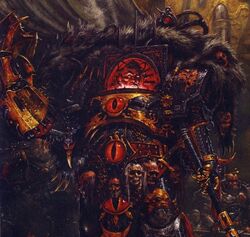
The Warmaster Horus during the Horus Heresy
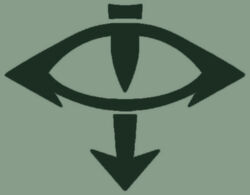
The infamous Eye of Horus
Horus, also known as the Lupercal during his lifetime by the Astartes of his Luna Wolves Legion, was one of the 20 genetically-engineered Space Marine Primarchs created by the Emperor of Mankind from the foundation of his own DNA before the start of the Great Crusade to lead the armies of the newborn Imperium of Man. Horus was the Primarch of the Luna Wolves Legion of Space Marines (later renamed the Sons of Horus), the first Imperial Warmaster, the most favoured son of the Emperor of Mankind, and ultimately, the greatest Traitor in the history of Mankind. Horus' homeworld was the Hive World of Cthonia which lay only a few light years from Terra. Horus was thus the first Primarch to be rediscovered by the Emperor after the Great Crusade began in the early 31st Millennium. Horus was responsible for unleashing the horrific 7-year-long civil war known as the Horus Heresy upon the Imperium of Man in the early 31st Millennium which killed billions of men, women and children in pursuit of his mad ambition to overthrow the Emperor of Mankind and replace him as the ruler of the human race. While Horus ultimately lost his bid for power and was slain by the father he had once so loved during the Battle of Terra, his actions damaged the Imperium of Man beyond repair and inaugurated the current Age of the Imperium, when Mankind is beset by countless horrific dangers to its existence and the Imperium itself has become a stagnant, repressive, intolerant and dehumanising galactic presence.
History
Early Life

A stylised illustration of the Warmaster Horus during the Great Crusade
Created as a genetically-engineered organism by the Emperor in the Imperial gene-laboratories under the Himalayan Mountains on Terra in the late 30th Millennium, Horus, along with his brother Primarchs, were scattered across the Milky Way Galaxy through the Warp by the machinations of the Ruinous Powers of Chaos. This is said to be when the Dark Gods first planted the seeds of heresy into the infant Primarch, whispering darkly into his soul and tempting him to their cause. The capsule carrying the infant Horus came to rest on the Mining World of Cthonia, the primary planet of a star system within a reasonable slower-than-light distance of Terra. Whereas the early history of many Primarchs is extensively if unevenly documented, the same cannot be said of Horus. Contradiction and omission tarnishes all accounts of Horus' formative years. It is clear that the Emperor did find Horus and also that he took command of the XVI Legion early in the Great Crusade. Beyond these manifest facts, agreement between the early Imperial sources is decidedly lacking, some even placing Horus on Cthonia as a foundling.
Like many of his superhuman brethren, these sources say that the young Primarch thrived in Cthonia's harsh environment, learning his first lessons in war and killing from Cthonia's tech-barbarian kill-gangs. The world of Cthonia had been settled in the very earliest days of Mankind’s exploration of the stars, its rich natural resources ruthlessly exploited until they were all but played out. Thus, Horus grew to maturity amongst the anarchic gangers that populated the post-industrial nightmare of a world honeycombed with long-extinct mines and dominated by decaying hive cities. Though Horus had not been raised during his formative years on Cthonia -- uncommonly, for a Primarch, he had not matured on the cradle-world of his Legion -- he spoke the harsh language known as Cthonic fluently. In fact, he spoke it with the particular hard palatal edge and rough vowels of a Western Hemispheric ganger, the commonest and roughest of Cthonia’s feral castes. Later on, it always amused some of the Battle-Brothers within the XVI Legion to hear this accent. They assumed that Horus spoke in this manner because that was how the Warmaster had learned the language, from just such a speaker, but many would come to doubt this hypothesis later on. Horus never did anything by accident, and there were those who believed that the Warmaster’s rough Cthonic accent was a deliberate affectation so that he would seem, to the Astartes of the XVI Legion, as honest and low-born as any of them. It was from the hyper violent gang-scum of Cthonia that many of the earliest inductees into the Space Marine Legions were recruited, and it was there that the Emperor had found the first of his lost sons.
Another source claims that Horus returned to Terra itself. It is said that Horus grew at the Emperor's side, learning from his father even as they took back the Sol System and forged the alliances between the techno-barbarian nations of Terra and with the Mechanicus of Mars that created the Imperium of Man. Other highly creditable claims state that the Emperor found Horus, the first of his lost sons, but neither source specifies where, or the location of this finding. Surrounded in millennia of myths and allegory, the truth of Horus' origins will more than likely never be known. As a result, Horus was for many standard years the Emperor's only son, and there was a great affinity between them. The Emperor spent much time with his protege, teaching and encouraging him. Horus was soon placed in command of the XVI Legion, which had already come to be known as the Luna Wolves -- 10,000 Astartes created from his own genetic code. With these superhuman warriors to lead, Horus accompanied the Emperor for the first thirty standard years of the Great Crusade that had begun in ca. 800.M30, and together they forged the initial interstellar expansion of the young Imperium of Man.
Great Crusade
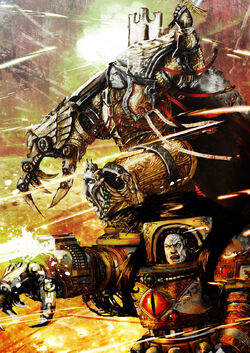
The Emperor fighting alongside Horus during the Great Crusade
Cthonia, relatively close to Terra in the void, and with whom some minor intermittent contact had been maintained even through the Age of Strife, had its murderous and strife-torn population marked by one of the first expeditionary fleets to leave the Sol System. With its resources stripped it had little strategic worth and its people were judged largely beyond illumination, but the fledgling Imperium needed teeth as well as ideals and that necessity saved Cthonia. Its youth was harvested in their tens of thousands, first as impressed troopers for the Crusade armies and then the finest specimens were taken for the Legion. On Luna these chosen sons of Cthonia were reborn as warriors of the XVIth Legion. With these new recruits came a further accolade. The Emperor in honour of their new birthplace, the ruthless propensities of the Cthonians and the victories of the past, gave the XVIth Legion a name to strike fear into his enemies. As they scattered to spill blood amongst unclaimed stars their enemies would know them as the Luna Wolves.
For thirty standard years, the Emperor and Horus fought the opening campaigns of the Great Crusade side by side, the Primarch learning at the foot of his sire. When at length the Emperor detected another of the Primarchs and departed to locate him, Horus was left at the head of his master’s hosts, entrusted with the command of the conquering armies. Horus was well suited to the task, and the lessons he had learned in the previous three decades served him well. As one by one the Primarchs were united with their gene-father and their brothers, Horus came increasingly to be regarded as the greatest of their number, the first amongst equals. While happy that he would soon meet one of his brothers, Horus swore to himself that he would always remain the Emperor's favoured child. The Luna Wolves waged war for two hundred years, pushing back the darkness with fire and blood. Their victories were manifold and Horus' generalship was legend, and so it was that the respect of their brother Legions rose to almost unrivalled heights.
While many of his brothers and the Space Marine Legionscreatedin their genetic image were gifted in specific fields of military science, Horus was a natural leader, his greatest genius his ability to meld seemingly divergent allies into a coherent whole. This skill was not only of use on the battlefield, for it carried over into contacts with the peoples the Great Crusade met. It was Horus’ way to treat with the populations of newly-contacted worlds according to the cultural traditions of each, and this highly successful doctrine was repeated in each of the Imperial Expeditionary Fleets. Horus believed that to do so would lessen the hostile reaction of opponents who wished to parley. Tragically, it might also have been the cause of the Primarch’s fall, and with him fully half of the Space Marine Legions.
As the Great Crusade pushed outward, and more Primarchs were discovered, the Emperor's time became divided, pulled in more and more directions. Horus was often placed in overall strategic command of the Crusade, a position in which he proved his skill as a leader time and time again. He quickly won the approval and support of the other Space Marine Legions, along with their leaders. One of the skills that made Horus such a great leader was that he possessed an innate understanding of human psychology; he was able to read in such a way that he could choose to promote their strengths or exploit their weaknesses. This allowed him to find a non-military solution in several campaigns as he used his sheer charisma and negotiation skills combined with the ever-present threat of the Space Marine Legions' unstoppable force to bring other human-settled worlds into Imperial Compliance without bloodshed.
His understanding of the human mind allowed Horus to bring out the best within his fellow Primarchs, which allowed him to deploy the various Legions into the battlefield roles to which they were best suited. He quickly learned of the skill displayed by the White Scars and Night Lords in deploying for rapid strikes, while the Imperial Fists and Iron Warriors were always placed at the forefront of planetary sieges. Horus was said to wield the Space Marine Legions, and later the human soldiers of the Imperial Army, as a lesser general would position individual squads to perform to their advantages. He was also responsible for promoting competitive rivalries between certain Space Marine Legions in the desire to spur these Astartes on to greater heights, but these rivalries would eventually transform into outright hatred when the Great Crusade took a turn for the worse.
Triumph of Ullanor
"You are like a son and together we have all but conquered the galaxy. Now the time has come for me to retire to Terra. My work as a soldier is done and now passes to you for I have great tasks to perform in my earthly sanctum. I name you Warmaster and from this day forth all of my armies and generals shall take orders from you as if the words came from mine own mouth. But words of caution I have for you, for your brother Primarchs are strong of will, of thought and of action. Do not seek to change them, but use their particular strengths well. You have much work to do, for there are still many words to liberate, many peoples to rescue. My trust is with you. Hail Horus! Hail the Warmaster!"
- —The Emperor of Mankind, during the Triumph of Ullanor
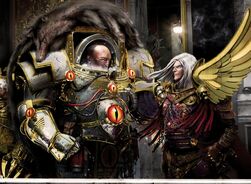
The Primarchs Horus and Primarch Fulgrim of the Emperor's Children during the great Imperial Triumph after the successful conclusion of the Ullanor Crusade
Though the Luna Wolves had won many victories in their years of ceaseless conflict, one would eclipse all others and see them reborn once again. The greatest of the nascent Imperium's victories during the high point of the Great Crusade came in the form of the defeat of the largest Ork empire ever encountered. The Ullanor Crusade was a vast Imperial assault on the Ork empire of the Overlord Urrlak Urruk. The capital world of this Greenskin stellar empire, and the site of the final assault by the Space Marine Legions, lay in the central Ullanor System of the galaxy's Ullanor Sector. The Crusade included the deployment of 100,000 Space Marines, 8,000,000 Imperial Army troops, and thousands of Imperial starships and their support personnel. The Ullanor Crusade marked the high point of the Great Crusade's vast effort to reunite the scattered colony worlds of humanity. The Orks of Ullanor represented the largest concentration of Greenskins ever defeated by the military forces of the Imperium of Man before the Third War for Armageddon began during the late 41st Millennium. Following the defeat of the Orks of Ullanor, the Emperor of Mankind returned to Terra to begin work on his vast project to open up the Eldar Webway for Mankind's use. In his place to command the vast forces of the Great Crusade he left Horus. In the aftermath of this Ullanor Crusade, Horus was granted the newly-created title of “Warmaster”, the commander-in-chief of all the Emperor’s armies who possessed command authority over all of the other Primarchs and every Expeditionary Fleet of the Great Crusade. Before returning to Terra to oversee the next phase of the creation of his stellar empire, the Emperor suggested to Horus that he rename the XVI Legion the "Sons of Horus," in honour of their Primarch and to show his preeminent place amongst the other Primarchs. Horus initially declined this honour, not wishing to be set above his brothers, and so his Legion continued as the Luna Wolves for a little while longer. But Horus and the other Primarchs never came to terms with the Emperor's absence. Their hurt feelings over his seeming abandonment of the Great Crusade to pursue a secret project whose purpose he chose not to reveal to his sons laid the seeds of jealousy and resentment that would ultimately blossom into the corruption that begat the Horus Heresy.
Corruption by Chaos

The Warmaster in his Dark Mechanicus-forged Terminator Armour
Shortly after the Luna Wolves Legion and their allies declared victory in the great Ullanor Crusade against the mightiest Ork empire faced by the Imperium until the 41st Millennium, the Emperor offered Horus the honour of renaming his Legion the Sons of Horus in honour of himself and to show his preeminent place among the other Primarchs. Horus refused this honour, characteristically not wishing to be set above his brothers, but was promoted to the newly-created rank of Imperial Warmaster, serving as the new Supreme Commander of the Imperium's millions-strong armies while the Emperor left the Crusade in Horus' capable hands and returned to Terra to pursue the secret Imperial Webway Project that he hoped would draw the newborn Imperium together in unbreakable bonds.
Despite the majestic rank and unparalleled authority bestowed on him, it was said that Horus was not content. The wording of the Emperor's declaration, claiming the glory of Horus' victories as entirely his own, chafed. Although this was the usual rhetoric for such Imperial announcements, Horus saw that while the Emperor remained behind in the Imperial Palace on Terra for reasons that he would not share even with his sons, Horus would be out in the field of battle, winning the Emperor's Imperium for him. It seemed that a deep-rooted resentment and jealousy had begun to simmer in the corners of the Warmaster's mind. As the Imperial Warmaster, Horus took over command of the Great Crusade, and accepted his new duties with earnest dedication. However, there was much dissension in the ranks of the Primarchs and other parties in the Imperium over the Emperor's decision to withdraw from the campaign and return to Terra as well as to reorganise the political administration of the Imperium under the control of a Council of Terra headed by his regent, Malcador the Sigillite. Only a handful of the Primarchs, amongst them a scheming Lorgar, remained steadfast beside the Warmaster during this period of conflict. Horus also disagreed with many of the decrees passed by the newly established Council of Terra, a ruling body of Imperial nobles and bureaucrats, which were intended to shift the burden of taxation and administration onto the newly-conquered Imperial Compliant worlds. Even worse, Horus came to believe in his heart that he was failing his father, and was deeply wounded that the Emperor had revealed to none of the Primarchs, not even his most favoured son, why he had secluded himself upon Terra and the truth behind his secret Imperial Webway Project. These seeds of bitterness, resentment and frustration grew, and would soon bear deadly fruit.
First Chaplain Erebus of the Word Bearers, the XVII Space Marine Legion that was secretly in league with the Forces of Chaos since they had been humiliated by the Emperor for their violations of the Imperial Truth on the world of Khur over 40 years before the start of the Horus Heresy, became a very close confidante and adviser of Horus. The Words Bearers, who originally had worshipped the Emperor as a God and whose Primarch Lorgar had penned the Lectitio Divinitatus before he turned against his father following the events on Khur, had been brutally reprimanded for their constant erection of temples and shrines dedicated to the worship of the God-Emperor on newly conquered worlds, a policy that had directly violated the Emperor's secularist philosophy and had slowed the XVII Legion's progress in the Great Crusade to a crawl. In the wake of his humiliation and the reprimand against his Legion on Khur, Lorgar had sought to discover whether there truly were divinities worthy of human worship during the quest that came to be known as the Pilgrimage of Lorgar. During this journey, Lorgar entered the Eye of Terror and came face-to-face with the power of Chaos, a force that he believed was truly divine and worthy of his service and the worship of all Mankind. He brought this faith to his Legion, and soon all the Astartes of the Word Bearers believed that the Chaos Godswere more worthy of their loyalty and worship than the Emperor who had proved himself to be a false god. With the guidance of the Ruinous Powers, Lorgar and the Word Bearers hatched their secret plans over the course of the next four decades to convert humanity to the service of the Dark Gods, starting with Horus.
After Lorgar placed his agent near Horus, Erebus slowly managed to twist the thinking of Horus against the Emperor and turn half of the Mournival, the Warmaster's most trusted advisers within the XVI Legion, towards the same path of treachery by exploiting their intense loyalty to their Primarch over that for their far more distant Emperor. This plot reached its climax on the moon of the Feral World of Davin, where Horus was wounded during a struggle against Eugen Temba, the former Planetary Governor of Davin who had rebelled against the Imperium following his corruption by Chaos. An ancient xenos artefact blade sacred to Nurgle known as the Kinebrach Anathame had been stolen by Erebus from the museum of an advanced human civilisation called the Interex during the Luna Wolves' brief sojourn on their world of Xenobia and had been given by him to Temba. Temba had become the mutated servant of Nurgle, the Chaos God of disease and decay, and managed to seriously wound the Warmaster with the corrupted blade. The Apothecaries of the XVI Legion proved incapable of healing the Warmaster's wounds despite every form of advanced medical technology at their disposal, until it seemed that Horus would surely die.
Erebus then convinced the Luna Wolves' warrior lodge to allow him to take the Warmaster to a secret sect on Davin and use sorcery at the Temple of the Serpent Lodge in order to treat the Warmaster. The creation of a warrior lodge within the Luna Wolves and many other Space Marine Legions based on the lodges used by the savage warriors of Davin had been another of Erebus' ploys to infiltrate and corrupt the Astartes into turning against the Emperor. However, not all Astartes of the Legions joined the lodges, as many saw them as a direct violation of the Emperor's desires that all Space Marines dedicate themselves to truth and openness. The lodges would prove to be the primary purveyors of corruption in those Legions which turned Traitor in the days immediately preceding the start of the Horus Heresy and those Astartes within those Legions which lodges which held themselves aloof from those secretive organisations were marked as Imperial Loyalists who would later be betrayed at Istvaan III.
The secret sect on Davin was in truth a Chaos Cult, and using sorcery, which was outlawed by the Emperor, the cultists managed to warp the mind of the Warmaster against the Emperor by playing on the seed of jealousy and resentment that he felt for his father after the Emperor had left the Great Crusade behind to return to Terra. During the dark rituals that followed within the temple, Horus' spirit was transferred from his body into the Immaterium. There, he bore witness to a nightmare vision of the future. He saw the Imperium of Man as a repressive, violent theocracy, where the Emperor and several of his Primarchs (but not Horus) were worshipped as Gods by the masses. While this vision of the Imperial future granted by the Chaos Gods was a true one, it was ironically an outcome largely created by the Warmaster's own actions. The Dark Gods portrayed themselves as victims of the Emperor's psychic might, and claimed that they had no real interest in the happenings of the material world. Magnus the Red, the sorcerous Primarch of the Thousand Sons Legion, had also travelled into the Warp via sorcery to try and stop Horus from turning to Chaos. Magnus explained that the Warmaster's vision was only one among many possible futures, but one that Horus alone could prevent. Horus, already jealous and resentful of the Emperor, proved all too receptive to the Ruinous Powers' false vision. The Chaos Gods' pact with Horus was simple: "Give us the Emperor and we will give you the galaxy." Driven by his jealousy, desire for power and anger at what he saw as his father's abandonment of him, Horus accepted the Ruinous Powers' offer. They healed his grievous wound and filled him with the powers of the Warp. Renouncing his oath to the Emperor, Horus led his Legion, renamed the Sons of Horus, into worship of the myriad Chaos Gods in the form of Chaos Undivided. He then sought to turn many of his fellow Primarchs to the service of Chaos, and succeeded with Angron of the World Eaters, Fulgrim of the Emperor's Children and Mortarion of the Death Guard, who were the first of many to follow, along with many regiments of the Imperial Army and several Titan Legions of the Adeptus Mechanicus.
Magnus the Red, the Primarch of the Thousand Sons Legion, foresaw Horus' actions through his Legion's own use of forbidden psychic sorcery. Magnus then attempted to forewarn the Emperor of the impending betrayal of his favourite son. However, knowing that he would have to find a means of quickly warning the Emperor, Magnus used sorcery to send his message to the Emperor. The message penetrated the potent psychic defences of the Imperial Palace on Terra, shattering all the psychic wards the Emperor had placed on the Palace -- including those within his secret project in the Imperial Dungeons, where he was proceeding with the creation of the human extension into the Webway. Refusing to believe that Horus, his most beloved and trusted son, would actually betray him, the Emperor instead mistakenly perceived the traitor to the Imperium to be Magnus and his Thousand Sons, who had long suffered from a near-debilitating run of mutations because of the instability of Magnus' own genome and were known to have practiced the sorcery that had been expressly outlawed in the Imperium. The Emperor ordered the Primarch Leman Russ, Magnus' greatest rival, to mobilise his Space Wolves Legion and the witch hunters known as the Sisters of Silence and take Magnus into custody to be returned to Terra to stand trial for violating the Council of Nikaea's prohibitions against the use of psychic powers within the Imperium. While en route to the Thousand Sons Legion's homeworld of Prospero, Horus convinced Russ, who had always been repelled by Magnus' reliance on psychic powers, to launch a full assault on Prospero instead, even though Magnus had been entirely willing to face the Emperor's judgment once he realised he was being manipulated by the entities that called the Immaterium home.
Horus Heresy
Istvaan III Atrocity
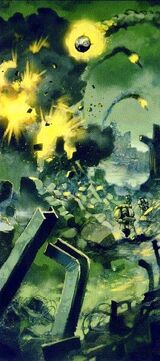
The virus-bombing of Istvaan III begins
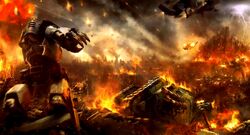
The Battle of Istvaan III begins in earnest, after the virus-bombing of the planet
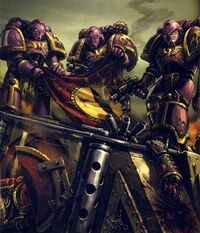
Loyalist Emperor's Children Astartes hold a grim trophy, taken from their traitorous former brethren
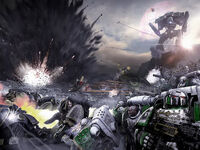
The initial phase of the Horus Heresy begins on the surface of Istvaan III
Unknown to the Emperor, the Word Bearers Legion had been devoted to Chaos Undivided for some time before this event. The Imperial Planetary Governor of Istvaan III, Vardus Praal, had been corrupted by the Chaos God Slaanesh whose cultists had long been active on the world. Praal had declared his independence from the Imperium, and practiced forbidden sorcery, so the Council of Terra charged Horus with the retaking of that world, primarily its capital, the Choral City. This order merely furthered Horus' plans to overthrow the Emperor. Although the four Legions under his direct command -- the Sons of Horus, the World Eaters, the Death Guard and the Emperor's Children -- had already turned Traitor and now pledged themselves to Chaos, there were still some Loyalist elements within each of these Legions that approximated one-third of each force; many of these warriors were Terran-born Space Marines who had been directly recruited into the Astartes Legions by the Emperor himself before being reunited with their Primarchs during the Great Crusade. Horus, under the guise of putting down the religious rebellion against Imperial Compliance on the world of Istvaan III, amassed his troops in the Istvaan System.
Horus had a plan by which he would destroy all the remaining Loyalist elements of the Legions under his command, a plan that would ultimately unfold into the nightmare of what Imperial scholars would later name the Istvaan III Atrocity. After a lengthy bombardment of Istvaan III, Horus dispatched all of the known Loyalist Astartes down to the planet, under the pretense of bringing it back into the Imperium. At the moment of victory and the capture of the Choral City, the planetary capital of Istvaan III, these Astartes were betrayed when a cascade of terrible virus-bombs fell onto the world, launched by the Warmaster's orbiting fleet. Captain Saul Tarvitz of the Emperor's Children, however, was aboard his Legion's flagship Andronius and discovered the plot to wipe out the Loyalist Astartes of the Traitor Legions. He was able, with help from Battle-Captain Nathaniel Garro of the Death Guard who was in command of the Death Guard frigate Eisenstein, to reach the surface of Istvaan III despite pursuit and warn the Loyalist Space Marines he could find of all four Legions of their impending doom. Those that heard or passed on Tarvitz's warning took shelter before the virus-bombs struck. The civilian population of Istvaan III received no such protection: eight billion people died almost at once as the lethal flesh-dissolving virus called the Life-Eater carried by the bombs infected every living thing on the planet. The psychic shock of so many deaths at one time shrieked through the Warp, briefly obscuring even the Astronomican. The Primarch of the World Eaters, Angron, realising that the virus-bombs had not been fully effective at eliminating all the Loyalists, flew into a rage and hurled himself at the planet with 50 companies of Traitor Marines. Discarding tactics and strategy, the World Eaters Legion's Traitors worked themselves into a frenzy of mindless butchery. Horus was furious with Angron for delaying his plans, but the Warmaster sought to turn the delay into a victory and was obliged to reinforce Angron with troops from the Sons of Horus, the Death Guard, and the Emperor's Children. Fortunately, a contingent of Loyalists led by Battle-Captain Garro escaped Istvaan III aboard the damaged Imperial frigate Eisenstein and fled to Terra to warn the Emperor that Horus had turned Traitor.
On Istvaan III, the remaining Loyalists, under the command of Captains Tarvitz, Garviel Loken and Tarik Torgaddon, another Loyalist member of the Sons of Horus, fought bravely against their own traitorous brethren. Yet, despite some early successes that delayed Horus' plans for three full months while the battle on Istvaan III played out, their cause was ultimately doomed by their lack of air support and Titan firepower. During the battle the Sons of Horus Captains Ezekyle Abaddon and Horus Aximand were sent to confront their former Mournival brothers, Loken and Torgaddon. Horus Aximand beheaded Torgaddon, but Abaddon failed to kill Loken when the building they were in collapsed. Loken survived and witnessed the final orbital bombardment of Istvaan III that ended the Loyalists' desperate defence. To prove his worth and loyalty to Lord Commander Eidolon of the Emperor's Children -- and thus to his Primarch, Fulgrim -- Captain Lucius of the 13th Company of the Emperor's Children, the future Champion of Slaanesh known as Lucius the Eternal, turned against the Loyalists that he had fought beside because of his prior friendship with Saul Tarvitz. Lucius slew many of them personally, an act for which he was then accepted back into the Emperor's Children on the side of the Traitors. In the end, the Loyalists retreated to their last bastion of defense, only a few hundred of their number remaining. Finally, tired of the conflict, Horus ordered his men to withdraw, and then had the remains of the Choral City bombarded into dust for a final time from orbit.
Preparations and Allegiances
Much of Horus' later success arose from the thorough groundwork he had laid before the opening shots of the Heresy were fired at Istvaan III. He had already swayed the Primarchs Angron and Mortarion, of the World Eaters and Death Guard Legions, respectively, to the side of Chaos because of their own various personal grudges against the Emperor. Fulgrim of the Emperor's Children had been lured to the side of the Warmaster by the promise of power and personal perfection that the Chaos Gods, especially Slaanesh, offered to him and his vain Astartes. Lorgar of the Word Bearers, who had been responsible for the nascent rebellion and Horus's own corruption by Chaos, was also with the Warmaster. Three of the most loyal Legions who could not be swayed to the side of Chaos, the Dark Angels, Blood Angels and Ultramarines and their Primarchs, were sent on missions by the Warmaster far from Terra and the Istvaan System. The Imperial Fists and White Scars were too close to Terra to be contacted without raising suspicion, though Horus believed -- mistakenly -- that the White Scars' Primarch Jaghatai Khan, would ultimately take his side. Shortly before the Drop Site Massacre on Istvaan V, Fulgrim also attempted to sway his friend Ferrus Manus of the Iron Hands Legion to Horus' cause by using many of the same inducements that had been offered to the Adeptus Mechanicus, with whom the Iron Hands were closely allied in both temperament and philosophy. This attempt failed, and Fulgrim barely escaped with his life. Angered by the rebuff, Fulgrim promised he would deliver Manus' severed head to Horus in recompense, a promise he kept on Istvaan V. The Blood Angels were sent to the daemon-infested Signis Cluster and the Ultramarines to the world of Calth, where a large Word Bearers force, under First Captain Kor Phaeron, had massed to hold Roboute Guilliman's equally massive Legion in place while Horus made his play for Terra.
Of the other eventual Traitor Primarchs, Konrad Curze, the Night Haunter, was due to face disciplinary action from the Emperor which he did not believe he deserved; the Alpha Legion Primarch Alpharius had always been closer personally to his brother Horus than to his father the Emperor, although some evidence indicates that he and his twin brother Omegon's turn to Chaos was driven by mistaken loyalty to the Emperor; and the Iron Warriors' Primarch Perturabo's open and bitter rivalry with Rogal Dorn of the Imperial Fists and his feeling that he and his Legion were handed the worst tasks in the Great Crusade for which they never received the recognition they believed they were due made him an easy target for corruption.
The Thousand Sons had never planned to join Horus, but the path Tzeentch had mapped for that Legion and their potent psychic Primarch Magnus the Red ultimately led them to Chaos regardless. Unfortunately, the Space Wolves' unexpected assault on the Thousand Sons' homeworld -- a brutal campaign remembered as the Scouring of Prospero -- resulted in the destruction of the libraries of precious knowledge that Magnus and his fellow Thousand Sons held so dear. Mortally wounded by Leman Russ, Magnus fell to temptation as he watched Tizca, the capital city of Prospero and its famed libraries of ancient knowledge burn and he called out to the Chaos God Tzeentch to save both himself and the remains of his Legion. The God of Sorcery was only too happy to oblige and he transported Magnus and the Thousand Sons through the Warp to the Daemon World later known as the Planet of the Sorcerers. Magnus became a Daemon Prince of Tzeentch and now desired only vengeance against the Emperor for what he saw as a betrayal, never realizing that it was Horus who had truly engineered his downfall and corruption.
The remaining Space Marine Legions -- the Raven Guard, Salamanders, Iron Hands and Space Wolves -- remained staunchly loyal to the Emperor, though all but the Space Wolves would pay dearly for it in the battles to come. Beyond the Legions, Horus had already swayed Magos Regulus of the Adeptus Mechanicus to his side with promises of the Standard Template Construct (STC) databases of ancient technology recovered during the war with the Auretian Technocracy. This alliance delivered crucial Adeptus Mechanicus and Titan support to the Warmaster's Traitor Legion and Traitor Imperial Army forces.
Meanwhile, Horus and his confidante and mentor in the ways of Chaos, the Word Bearers' First Chaplain Erebus, conducted a ritual designed to communicate with the Chaotic entities of the Warp. They established contact with a daemon called Sarr'kell, who acted as an emissary of the Chaos Gods to Horus and the Traitor Legions. Horus was then deceived by the daemon into believing that the Chaos Gods had no interest in dominating the material universe, and were only lending their support so that Horus could overthrow the Emperor, who they claimed was creating devices that could destroy the daemonic beings of the Immaterium. Horus agreed, and promised to swear loyalty to Chaos Undivided after his fateful operations on Istvaan III.
Drop Site Massacre
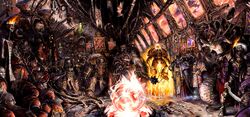
The Warmaster Horus and his fellow conspirators plan the next campaign against the Imperium of Man
Of the seven Legions sent to Istvaan V, four turned to the side of Horus. Between them and the three Legions already on planet, they almost completely annihilated the loyal Iron Hands, Salamanders and Raven Guard Legions during the infamous Drop Site Massacre. Horus had just declared civil war on the galaxy, beginning a series of events that would still bear his name ten thousand years later.
In total, nine Space Marine Legions turned Traitor, along with many regiments of the Imperial Army and the battlefleets of starships which were under their control. They began to lay waste to the Imperium that Horus had fought so hard to construct. The Horus Heresy came close to shattering the Imperium as brother fought brother on the battlefields of a thousand worlds.
Battle of Terra
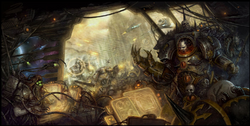
The Warmaster Horus aboard his Battle Barge Vengeful Spirit during the Siege of Terra
The final stage of Horus' plan to defeat the Emperor resulted in the fifty-five day Siege of the Emperor's Palace on Terra. Battering the defenders with almost innumerable forces, Horus may have achieved his goal. However, on the fifty-fifth day, Horus learned that the Space Wolves, Ultramarines and Dark AngelsLegions were on their way to reinforce the horribly outnumbered Loyalist forces on the surface.

The final battle between Horus and the Emperor
Gambling the result of the Heresy on a single action, Horus lowered the shields protecting his Battle Barge, the Vengeful Spirit. The Emperor, accompanied by the Blood Angels' Primarchs Sanguinius and Imperial Fists' Primarch Rogal Dorn, an elite bodyguard of Legiones Custodes and a detachment of Space Marines, teleported aboard the Warmaster's flagship, but were scattered throughout the Chaos-warped starship by the Ruinous Powers at Horus' command. Horus easily defeated several Veteran Imperial Fists before slaying Sanguinius, the angelic Primarch of the Blood Angels. Finally, the Emperor himself found his way to Horus' throne room, and engaged his once-beloved son in a titanic duel.
Although accounts of the actual battle vary, almost all confirm that the end of the duel resulted in Horus' death, and the fatal wounding of the Emperor. Knowing instantly that their leader had fallen, the Forces of Chaos that had declared their loyalty to Horus splintered and fled, their daemonic allies disappearing back into the Warp without Horus's power to maintain their link to the material universe. Pursued by Imperial forces, most of the Traitor Legions retreated into the vast Warp Storm in the Segmentum Obscurus known as the Eye of Terror. The Sons of Horus did likewise, but under the direction of Horus' First-Captain, Ezekyle Abaddon, the remaining Chaos Space Marines of the Traitor Legion took the time to launch an assault on Horus' battle barge and retrieve their leader's body from the throne room of the Vengeful Spirit.
After Death
The tragic tale of Horus does not end with his death aboard the Vengeful Spirit. His body was enshrined on the Daemon World the Sons of Horus claimed for their own within the Eye of Terror after they fled Terra and renamed themselves once more as the Black Legion. Horus' corpse resided there for several hundred years, before the body was stolen by the corrupted Apothecary Fabius Bile and the Emperor's Children Traitor Legion, in an attempt to clone the body of the Warmaster to bring Horus back to life so that he might lead the Traitor Legions once more in an attempt to conquer the Imperium. Abaddon led an assault on the Emperor's Children's fortress, and believing that the continued worship of his Legion's dead Primarch had trapped the Traitor Legions and led them to the brink of destruction, Abaddon utterly destroyed Horus' corpse and claimed the Warmaster's Power Claw, the Talon of Horus, as his own, as well as the title of Warmaster of the Forces of Chaos.
Wargear
- Serpent's Scales - Horus' unique suit of Terminator Armour, known as the Serpent's Scales, was one of the first prototypes of its kind, fashioned by Master Adept Urtzi Malevolus and continuously improved by the hand of the traitorous Fabricator-General of Mars, Kelbor-Hal, and some of the greatest Artificers of the Imperium. It was proof against attacks of both brute and esoteric origin.
- Worldbreaker - Worldbreaker was a Power Maul the size of a mortal man marked out with the Imperial Aquila at the base of its grip. As well as being a weapon capable of shattering armoured Ceramite, it was also a signifier of Horus' rank as the Warmaster of the Imperium. It is said to have been created by the hand of the Emperor Himself and presented as a gift to his favoured son on the day Horus was raised to become the Warmaster and the Emperor announced that he was returning to Terra.
- Warmaster's Talon - The Warmaster's Talon is a unique Lightning Claw which incorporated a baroquely styled twin-Bolter that was a precursor of a modern Storm Bolter. The Talon had long been Horus' favoured weapon. Some apocryphal sources claim it was an antediluvian relic that was found deep within the planet Cthonia, and was a product of Mankind's Dark Age of Technology.
Sources
- Codex: Chaos Space Marines (6th Edition), pp. 6, 8-12, 14, 20, 23, 40, 48, 57, 62, 69
- Codex: Chaos Space Marines (4th Edition), pp. 12-15, 22, 46
- Codex: Chaos Space Marines (3rd Edition, 1st Revision), pp. 4-5, 44
- Codex: Chaos Space Marines (3rd Edition), pg. 22
- Codex: Chaos (2nd Edition), pp. 8-11, 17-18, 98-99
- Codex: Space Marines (4th Edition)
- Deathwatch: First Founding (RPG), pp. 7, 14, 20, 37, 76-82, 90-91
- Horus Heresy: Collected Visions, pp. 9, 45-47, 49-50, 54, 58, 62, 65, 70, 73, 75, 78, 81-82, 98, 109-110, 113-114, 127, 129, 132, 158, 164, 171-172, 188, 196, 226-228, 230, 249-250, 252, 256, 261, 265, 272, 276, 279, 290, 296, 299, 307, 313, 315, 324, 330-332, 334, 336, 342, 344, 346-347, 352-354, 356-369
- Imperial Armour - The Horus Heresy Betrayal - Book One, pp. 22-25, 29, 40-41, 44, 47-51, 55, 64, 66-70, 78-83, 244-247
- Index Astartes IV, "Sons of Horus - The Black Legion Space Marine Legion"
- Realm of Chaos: The Lost and the Damned (2nd Edition), pp. 9, 164, 177-184
- Realm of Chaos: Slaves to Darkness (2nd Edition), pp. 240-241, 243-244, 268
- Warhammer 40,000 Rulebook (6th Edition), pp. 137, 158, 160-161, 168, 183, 186, 225, 228, 380, 403
- White Dwarf 268 (US), "Assault on Holy Terra", "Abaddon the Despoiler" & "Index Astartes First Founding: Sons of Horus, The Black Legion Space Marine Chapter"
- Horus Rising (Novel) by Dan Abnett
- False Gods (Novel) by Graham McNeill
- Galaxy in Flames (Novel) by Ben Counter
- Flight of the Eisenstein (Novel) by James Swallow
- Fulgrim (Novel) by Graham McNeill
- A Thousand Sons (Novel) by Graham McNeill
- Nemesis (Novel) by James Swallow
- The First Heretic (Novel) by Aaron Dembski-Bowden
- Prospero Burns (Novel) by Dan Abnett
- Age of Darkness (Anthology) edited by Christian Dunn, "Little Horus" by Dan Abnett
- Deliverance Lost (Novel) by Gav Thorpe
- Betrayer (Novel) by Aaron Dembski-Bowden
